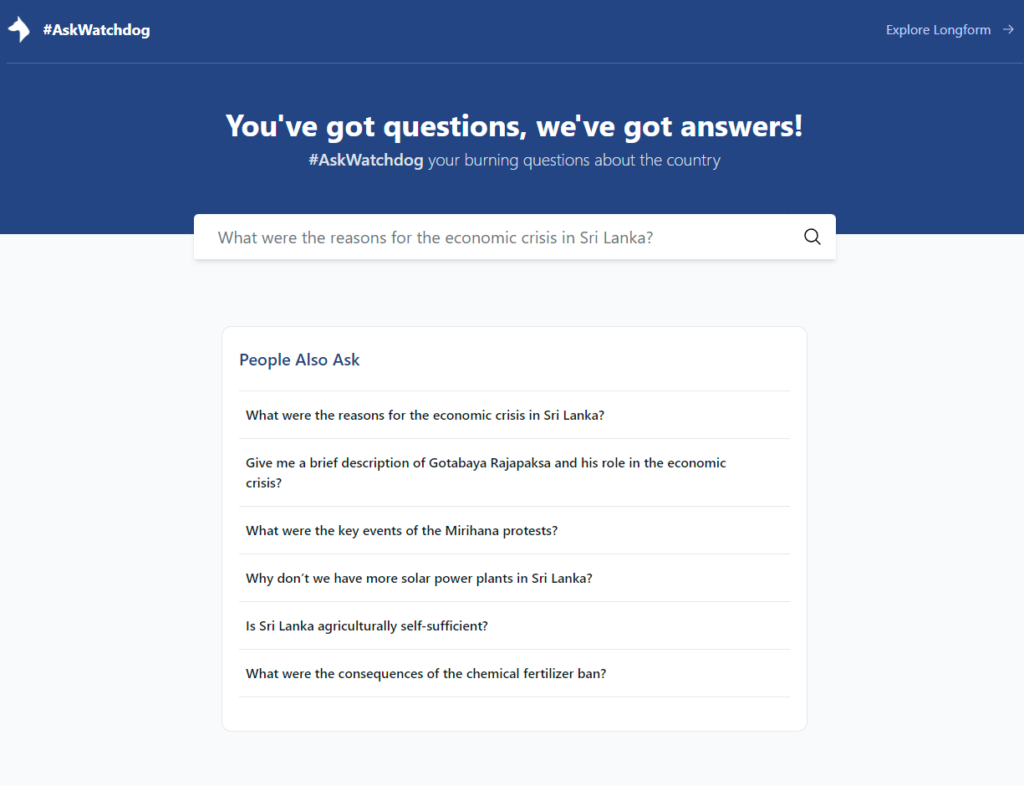AI, it’s everywhere. From Microsoft’s aggressive push with OpenAI to Google’s own recent LLM-fueled AI integrations, it’s a space that has seemingly taken the spotlight in many conversations. Now, Sri Lanka’s own Team WatchDog is getting in on the action. But instead of trying to dominate every aspect of the internet, WatchDog envisions an AI-enabled search engine that can answer all your burning questions about Sri Lanka.
From fact-checking to open-source research collective
WatchDog first started off as a fact-checking initiative in the aftermath of the 2019 Easter Sunday attacks. The idea was to verify local stories in quick time while disputing fake news through trusted multiple sources. According to CEO and Cofounder Yudhanjaya Wijeratne, the service recorded over 200,000 users via website and app.
The team went on to offer long-form research tackling topics ranging from Sri Lanka’s decades-old electricity problem to the numerous issues surrounding the lackluster public transportation system. Now, the team wants to take things further in the form of a curated search engine with the help of large language models.

But why WatchDog AI? As per Yudhanjaya, it isn’t enough to produce long-form content distilling specific topics. In fact, most would prefer posing questions as opposed to reading lengthy articles. While WatchDog did start a Q&A segment to specifically address this, its long-term feasibility remains questionable for the team. Hence, a localized search engine to expedite the process more efficiently.
How does WatchDog AI work?
The tool is fairly straightforward, ask a question and it will spit out an answer with sources. At the moment, the data for these answers are sourced from WatchDog’s own content, Our World In Data, and Wikipedia. So, for instance, if you ask something like “Does Sri Lanka have any renewable energy projects running?” the search engine will offer a breakdown with relevant sources. This includes Sri Lanka’s energy generation capacity and a list of approved renewable energy projects, along with added context about the Sri Lanka Electricity Amendment Bill.
On the other hand, if you ask something along the lines of “How many active internet users does Sri Lanka currently have?” it will tell you it’s 8.5 million based on 2020 data and that more recent information may be available. So WatchDog’s AI might not have all the answers for you and it will specify limitations if that’s the case.
After all, WatchDog’s AI primarily functions as a digital research assistant that breakdown long-form content into quick digestible chunks of text. So it’s not going to help you with your coding or act as a ChatGPT-like conversational AI as some of the billion-dollar LLM-powered tools do. In fact, part of WatchDog’s efforts in building the search engine is preventing the model from hallucinating answers and “confining models to a very specific, hand-curated dataset,” as Yudhanjaya puts it.
Ironing out the kinks
Of course, this doesn’t necessarily mean the search engine is perfect either. For example, “Why is there no PayPal in Sri Lanka?” will give you a long-winded answer that somehow includes Sarvodaya USA and Sri Lanka’s IMF bailout. But it should be noted WatchDog itself has clarified that the AI-based tool might not always have the right answer for you and that it’s currently in the prototype stage. In other words, the tool would likely get better in time over cycles of tweaking.
WatchDog also mentions that it hopes to iron out the search engine and optimize it further such as adding translations. For now, anyone interested can check out WatchDog’s AI-enabled search engine here.







GIPHY App Key not set. Please check settings